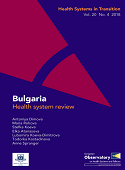Bulgaria HiT (2018)

Download
The European Observatory on Health Systems and Policies has released a new (HiT) health system review on Bulgaria with a special focus on the developments and health system reforms since 2012. This new report will be launched in Varna, Bulgaria, at the Prof. Dr. P. Stoyanov Medical University on 1-2 October 2018.
Health status low, health inequalities high
Despite marked and notable progress in some health indicators such as infant mortality, Bulgaria lags behind EU averages. This derives from unsteady improvement patterns and a steeper increase in, for example, life expectancy in other countries, therefore, Bulgaria records a relatively low-level life expectancy. This situation is further exacerbated by large socioeconomic and regional health inequities.
Problems of financial protection, accessibility and quality
Poor health status is also partly related to the underperformance of the Bulgarian health system, which is demonstrated by high levels of amenable mortality. While the share of gross domestic product spent on health expenditure has increased (up to 8.2% in 2015), the Bulgarian social health insurance system provides an insufficient degree of financial protection. Out-of-pocket spending represents nearly half of health spending (47.7% in 2015), which is three times higher than the EU average. Accessibility and quality of care is also threatened by imbalances in the allocation of resources. Health professionals are concentrated in urban areas and still too many interventions are performed in hospital settings.
Reform
A lot of these problems have been acknowledged in various reform initiatives and particularly in the 2015 National Health Strategy, however, only a few have been successfully implemented. A political vision and broad consensus among all stakeholders is needed to end the standstill.





















